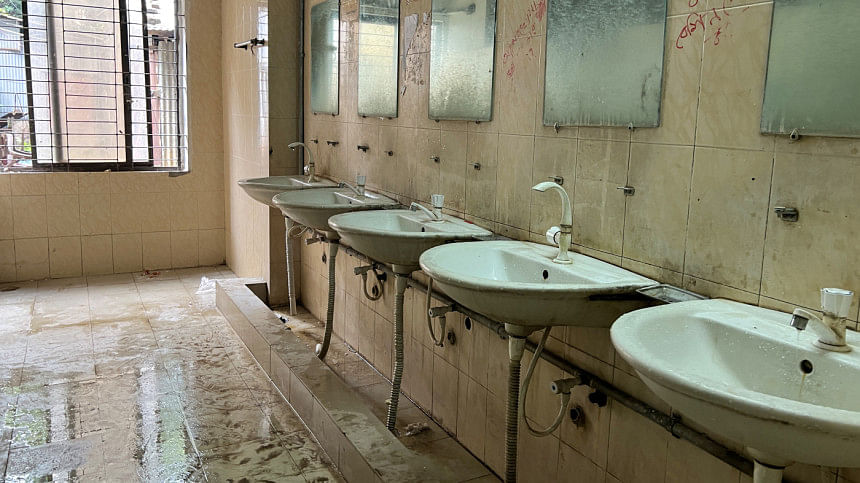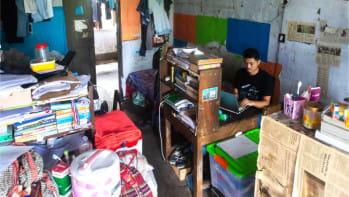The sorry state of washrooms at Dhaka University

Let me tell you a story – two, in fact.
I was in the early years of my undergrad journey, still figuring out the ins and outs of university life. It was during this early phase that one day, the lights went out in one of the washrooms. Everyone avoided the bathroom like it was the plague reincarnated. I, on the other hand, saw an opportunity. It was the cleanest washroom in the entire building as the lights there were yet to be fixed and, as a result, no one was using it. It might have been pitch black, but at least it didn't smell like despair. So, I used it. Honestly, I was kind of mad when the lights got fixed. My secret hideout was ruined.
The other time, when I was still a clueless first-year student, I made the tragic mistake of going into the girls' common room's washroom at the Arts Building. I went in, did my business somehow, looked in the mirror, and immediately made a lifelong vow: never again. I never went back.
At Dhaka University (DU), the state of a washroom can be personified. There are some you avoid, others you tolerate, and a rare few you mourn.
I visited 18 washrooms to write this article. I could write a review, but perhaps to truly encapsulate what the state of the washrooms is really like, I talked to students who have to use them regularly.
When I visited the washrooms in the Social Sciences Faculty, they were operational. While a few restrooms had soap bars, none had toilet paper. Students were observed bringing their personal soap packets for use. As a student of the same faculty, I do the same, as I cannot rely on the availability of soap and toilet paper.
Alo Akter, a student of the Social Sciences Faculty, concurs, "The washrooms are dirty, inside and out. The stench is intolerable. The girls' common washrooms are unclean, the doors cannot be locked, and sometimes there's no water supply. It really makes me suffer."
Students are often reluctant to use washrooms because of the tragic state of the washrooms. Sumaiya Tasnim, an undergrad student currently studying under the Faculty of Social Sciences, reflects on her anxiety about using the washrooms, "I have to use the washrooms; I stay on campus for five to six hours every day. It makes me anxious to use the washrooms because I know it's not clean."
Speaking to a few other female students in the girls' common room in the Social Science Faculty paints a similar picture. The anxiety of using washrooms sometimes forces female students not to use the washrooms at all, which can cause health complications such as urinary tract infections (UTIs). UTIs occur when bacteria make their way into the urinary tract. If one doesn't empty their bladder when required, the bacteria are more likely to sit and multiply in the bladder.
The washrooms in the Faculty of Science were in similar condition. The washrooms at Curzon Hall were antiquated, which was not surprising given that the building itself was built over a century ago. However, this does not excuse the building's poor condition while it is still in use by students and personnel.
Fahmida Jahan Ritu, a student from the Faculty of Science, has similar concerns about the Curzon Hall washrooms. She says, "The department washrooms are somewhat in better condition, but there's still room for improvement."
The male washrooms are not all that different either. I had to ask a few male students for perspective.
Junayet Rasel, a master's student at the Department of Mass Communication and Journalism, says, "The washrooms in the Social Sciences Building are quite good. However, they are not cleaned most of the time. The availability of soap or hand wash is also very rare. Compared to other places in DU, they are better."
Faiyaz Ahnaf Samin, another student at DU, reflects on the sorry state of the Teacher Student Centre (TSC) washrooms, "TSC washrooms are not only used by students; these washrooms are used by the people who visit TSC too. Not everyone has lavatory literacy, so it's understandable that the washrooms are dirty."
Following Faiyaz's comment, I visited the TSC washrooms; a male friend accompanied me.
Out of all the washrooms inspected, TSC washrooms were in the most deplorable state. Both the male and female washrooms emitted a foul odour and had no soap either. The female washroom had a sanitary napkin dispenser, which earned it some points. Faiyaz notes that given the number of people who use these public access washrooms, they need to be cleaned more often.
Among the 18 washrooms, the state of the washrooms of the Business Studies Faculty (FBS) was relatively somewhat satisfactory. Some of the restrooms had soaps and sanitary napkins, but the cleanliness was consistently poor.
Tahmina Chowdhury, a master's student at the same faculty, remarks, "The washroom facilities in our common room are inadequate compared to the number of students."
She also says that although there are washrooms in other buildings, students from across the entire faculty use the common room washroom. As a result, the quality and maintenance of the washroom require significant improvement.
Another FBS student, Sajid An Nafiew, says, "The male washrooms in FBS are comparatively better than those in TSC or other faculties, but they still fall short in terms of cleanliness and hygiene standards."
Sajid also points out that essential items like tissue, sanitisers, soaps, and hand washes are missing in washrooms. He did, however, have a few positive things to say about the condition of the FBS male common washrooms.
The chorus of student voices offers no ambiguity. Across faculties and buildings, the accounts are nearly identical: soap is a rare find, water supply is unreliable, and cleanliness is a matter of chance. The budget allocated for these issues is insufficient. There are many compromises made at the expense of students' health. What emerges is not just a sanitation issue but a pattern of institutional apathy. Students, particularly women, speak of anxiety, discomfort, and calculated strategies to avoid using the facilities at all.
It raises a larger, disheartening question – how can we envision institutional or academic progress, or equitable reform when the infrastructure fails at such a fundamental level? If the upkeep of a washroom, a basic and essential facility, is too much to ask of our universities, what does that signal about the priorities of those in charge?
Yet the burden does not lie solely with the administration. Washrooms are shared spaces and shared spaces demand shared responsibility. Several students noted that poor conditions are often made worse by the careless behaviour of their peers. Tissues flushed improperly, footprints on toilet seats, unflushed toilets – these speak not to a lack of resources but to a lack of consideration. Cleaners can only do so much in the face of daily misuse. If students want better, they too must treat these spaces with the respect they demand from the institution.
Azra Humayra is majoring in Mass Communication and Journalism at the University of Dhaka. Find her at: [email protected]

 For all latest news, follow The Daily Star's Google News channel.
For all latest news, follow The Daily Star's Google News channel. 









Comments